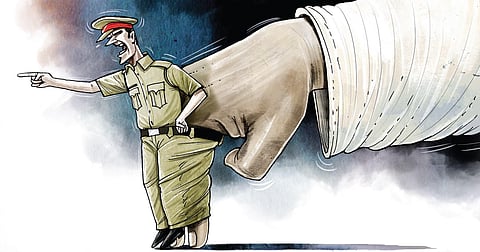

The Delhi Police has been in the news recently for the wrong reasons. When northeast Delhi was convulsing under violence and mayhem, the nation was shocked to see police action and inaction that defied logic. (Of course, every irrational action has its own dubious logic and rationality!) The judiciary was compelled to make scathing remarks to spur the police into action. Police, as the arm of the state mandated to maintain law and order, cannot afford to look the other way when mobs are on the rampage. The whole legitimacy of governments rests on the reasoning that they collect taxes and other revenue and wield power in order to protect the weak, maintain peace and provide confidence to law-abiding citizens. To achieve these social objectives, the state has armed the police with enabling legislations and authority to act in times of violence and upheavals. That confidence in the rule of law is the bedrock of any civilised society.
The mandate and ethos of the police force in colonial days was entirely different. The colonial government had no mandate to rule over the people. They entrenched themselves through force, greed and questionable political strategies with the sole aim of enriching Britain by depleting India. They had to resist any challenge to their authority by strong police action. Dissent was sedition. Gandhiji and several other patriots were charged with sedition. A police force used by the colonial administration to quell nationalist uprisings was expected to be loyal to the ruling class and trained to use force unsparingly.
In a democracy founded on a Constitution that enshrines liberal values, the state has an inalienable responsibility to protect the basic human dignity of people and guarantee their right to life and property. Accordingly, police and all government machinery are mandated to act judiciously to protect these basic rights and guaranteed freedoms. This is what is expected of bureaucracy and police in times of social and political unrest and violence. The framers of the Constitution had created all-India services like the IAS, IFS and IPS along with other Central services to ensure professional competence, integrity and fairness in administration.
That is why these services have been called ‘the steel frame’ that would provide cohesion, professional management and continuity amidst political changes and uncertainties (to be expected in a democracy). Our civil service, unlike the system in the US and some other nations, is permanent in the sense that bureaucrats are not fired and hired by changing political dispensations (There are currently attempts to tweak the steel frame by lateral induction from other domains.) Among all these services, it is the police service that the political executive expects to be most loyal. Other services too come under pressure but it is the IPS and police hierarchy in particular that have consistently experienced the demand for loyalty from the political class (of all hues).
Partisan loyalty and professionalism are incompatible bedfellows. We have a history and tradition of parties in power treating the police as ‘their men’ with clearly defined (unfair) expectations. Of course, a section of the constabulary and officers will always be more than willing to dance to the tune of the ruling political elite of the times. Such continued unholy and unprofessional nexus has some major undesirable consequences. One, this loyalty-switching begins to be generally accepted as inevitable and natural. Second, the citizens too begin to lower their expectations of fairness and political neutrality and accept the need for ‘right connections’ even for the most genuine matters. Third, a patron-client relationship arises at various levels between the needy citizens and politically well-connected intermediaries who can influence the police.
People tend to forget that a professional police force does not behave like this. Sadly they accept this distortion as natural. The police require ‘orders from above’ to do what is mandated and legal. It is this unnatural situation that forced the court to ask the Delhi Police about whose orders are required to act in public interest. In the present scenario, however, those having a political ideology different from that of the ruling party cannot expect the police to give them any protection. Despite guidelines, getting an FIR lodged in a police station by a person on the ‘wrong side’ of the political spectrum is no easy task. Policing in our country makes one feel that there are only ‘privileges of the powerful’ and no rights to the powerless.
Governments have been indifferent to the compelling need to professionalise our police force for self-evident reasons. A professional police force is not politically useful in the short-term. But in the long-term, this myopic convenience leads to a long-term wreckage of democratic values and erosion of citizens’ confidence. Any talk about professionalising the police force (there is no dearth of commissions and expert recommendations) has ultimately been reduced to ‘modernising the police’. These two are not necessarily identical. By buying hi-tech gadgets alone (which may be necessary), a police force does not become modern or professional.
A professional police force has to distinguish itself by its commitment to the rule of law, standard procedures, concern for human dignity and democratic rights and appropriate attitudes, skills and values to act legally, objectively and morally in any crisis without fear or favour. Professionalism is all about having the inner strength and capability to do the right thing in every calamity, crisis and contingency. It is the abysmal lack of professional competence and integrity that led to the loss of many lives in northeast Delhi recently. Without professional policing any situation can be manipulated by those who scheme and incite people with ulterior motives. Evidently that is not a badge of honour for a country eager to be a $5 trillion economy!
K Jayakumar
Former Chief Secretary, Government of Kerala and former Vice-Chancellor, Thunchath Ezhuthachan Malayalam University Email: k.jayakumar123@gmail.com